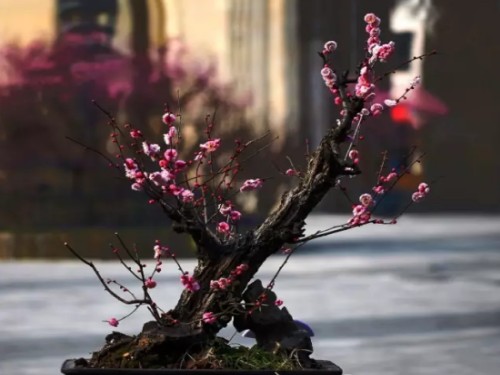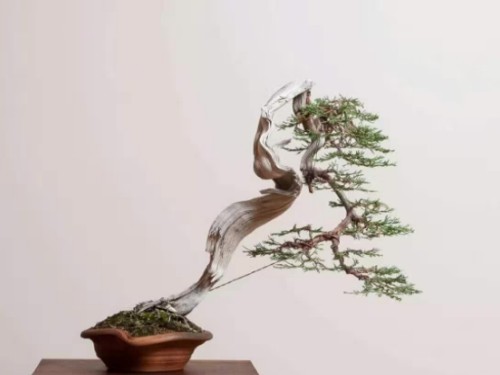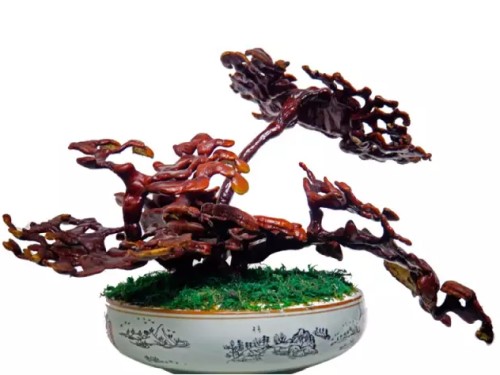Cultivation techniques of red plum bonsai
Red plum-it is a kind of flower, a kind of pure and beautiful flower. Cold condensation earth, it tenaciously blossoms beautiful, pure and thin flowers, some white through red, some white and elegant, some pink like glow …... Petals are moist and transparent, like ice carvings, if jade carvings. It is colorful, brilliant and fragrant, fluttering with the wind, like colorful clouds dressing up the earth, dotted with the end of winter. The pink and tender stamens emit seductive fragrance, which makes people forget all the unhappiness. Wander in the plum blossom bushes, if you take a deep breath, it is fragrant, heart into the spleen, suddenly feel relaxed and happy. "from a distance, we already know that it is not snow, because there are waves of fragrance coming." The aroma is far from comparable to that of other flowers.
Plum blossom in addition to big trees, usually potted, cultivate bonsai, but also can develop Cang Lao Meizhuang. Plum blossoms are in full bloom in the cold winter under natural conditions, falling in profusion, fragrant snow into the sea, fragrance spread far away. Potted plants or bonsai plum blossoms can be arranged as the main scene when blooming, and it is best to arrange them alone. Potted red plum is mainly cultivated by grafting, commonly cut and bud grafting. Use hairy peaches or apricots for anvil. Apricot tree old dry skin red, grafted red plum, flower skin color coordination.

1. Splice
Cut off the rootstock that is more than one or two years old, and cut off the upper part of the rootstock at the end of March (in the cold room) or in early April (in the open field) at a distance of 5cm from the ground. The scion uses annual sturdy branches, cut to grow 5 Mel 6 cm, and leave at least 3 buds. The outer sides of the last bud are slanted downwards into a duck's bill. Open a 3 cm long joint on one side of the rootstock. Insert the scion into the cut of the rootstock to form a close combination, and then bind it with plastic tape. Or stick it with polyester tape. Finally, the scion is covered with a small plastic bag, and the mouth of the bag is tied below the interface, which can often be checked through the film. After survival, remove the bindings.
2. Budding
Bud grafting is carried out from August to September, and the "T" shape connection method is generally used. First 1-1 at the top of the ear bud. 5 cm cross-cut, and then cut forward and downward from 1 cm below the bud, gently peel off the wood inside the cortex of the bud (some with wood buds in recent years). Cross-cut the rootstock 5 cm from the soil, then cut down from the center of the cut, showing a "T" shape, then gently peel off the cortex and insert the prepared scion into the cortex of the "T" mouth. The buds should be solid, and the upper end should be closely combined with the upper end of the "D" mouth of the rootstock, and finally tied up with plastic film strips or polyester tape. Check the survival situation a week later, if the petiole falls immediately and the bud is green and full, it means survival. In the following spring, the top of the rootstock will be cut off 5ml 6cm upward from the interface, and the scion will germinate quickly. after that, pay attention to cutting the rootstock buds, and when you want to change the pot or plant it on the pot, you can plant it deeply downwards to make the interface as low as possible, tie it up according to the growth, and lead it to form a beautiful shape.
3. Distribution of soil
Mix 1x3 rice bran ash with 2ap3 river mud, mix well with human feces and urine, expose to the sun, sift and set aside. The bottom of the basin is padded with tiles and stones to facilitate drainage, then loaded into the thicker-grained soil, and then planted with plum piles to bury the soil to compact the roots.
4. Watering
It is not suitable to water the pot, once a day after 3-4 days, once a day after 7-10 days, and twice a day from May to August after survival. The soil should not be too wet, do not burst water.
5. Fertilization
Plum blossom does not like big fat, when the new shoot grows to about 5 cm, it can be applied a thin bone jam fertilizer water to promote the growth of branches. When putting leaves, there should be sufficient fertilizer and water, and rarefied liquid fertilizer should be applied once a month to promote luxuriant branches and leaves. When the branches grow to 20-25 cm, fertilizer and water should be controlled. Topdressing was applied twice in late summer and early autumn to promote flower bud differentiation. After each fertilization, attention should be paid to timely watering and loosening the soil in order to keep the basin soil loose and beneficial to the development of root system.
6. Lighting
Plum blossoms like a sunny and well-ventilated environment and cannot tolerate long-term shade. Only by giving sufficient light to obtain the conditions for photosynthesis, can we obtain sufficient nutrition, so that we can grow healthily and produce many and large bright flowers.
7. Pruning
In order to have more flowers, pruning can be used to make multiple branches, potted plum pruning is more important than open field cultivation, and should be thinned and cut equally, short cut and buds should be thinned before flowering. If the tree is strong or young, it should be cut lightly, and if the tree is weak or old plum stump, it should be cut heavily. Pay attention to the direction of the cut when pruning. Generally, varieties with drooping branches leave inner branches, and varieties with straight or oblique branches leave outer buds.
8. Florescence
In order to make potted plum blossoms open during the Spring Festival, the key is to grasp the heating period and maintenance and management measures. If you heat up too early, the flowers will bloom ahead of time, and if they are too late, they will blossom later. If the buds are still small one week before the Spring Festival, they need to be managed in an environment of 20 to 25 ℃. If the bud blooms ahead of the Spring Festival, the plant can be moved to a low temperature environment, and there is little sunlight, which can prolong the florescence and maintain the florescence for about half a month.
Time: 2019-05-24 Click:
- Prev

Bonsai cultivation techniques of Sabina vulgaris
Sabina vulgaris is a positive plant, this kind of tree is more shade-tolerant plants, we must choose a relatively dry soil when planting Sabina vulgaris.
- Next

Cultivation techniques of Ganoderma lucidum bonsai
Ganoderma lucidum bonsai is a kind of stereotyped handicraft made from mature dried Ganoderma lucidum in recent years. The use of foam plastic greenhouse technology will be in the growth stage of Ganoderma lucidum live pot to make live Ganoderma lucidum bonsai, like potted flowers, can be seen Ganoderma lucidum seedling stalk elongation
Related
- Fuxing push coffee new agricultural production and marketing class: lack of small-scale processing plants
- Jujube rice field leisure farm deep ploughing Yilan for five years to create a space for organic food and play
- Nongyu Farm-A trial of organic papaya for brave women with advanced technology
- Four points for attention in the prevention and control of diseases and insect pests of edible fungi
- How to add nutrient solution to Edible Fungi
- Is there any good way to control edible fungus mites?
- Open Inoculation Technology of Edible Fungi
- Is there any clever way to use fertilizer for edible fungus in winter?
- What agents are used to kill the pathogens of edible fungi in the mushroom shed?
- Rapid drying of Edible Fungi

